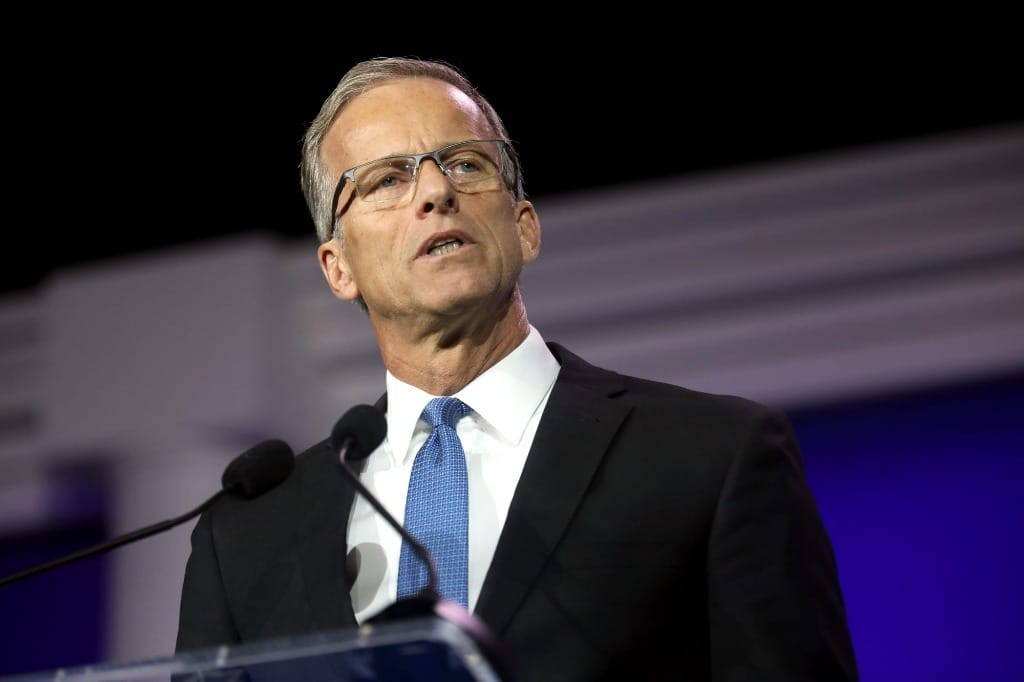Thune: Expect Senate Resolution Overturning FCC’s Wi-Fi Hotspot Rules
The Congressional Review Act resolution will likely be taken up soon, Thune said.
Jericho Casper

WASHINGTON, Feb. 26, 2025 – Senate Majority Leader John Thune said Monday that he planned for the chamber to vote on a resolution repealing a Biden-era program expanding internet access for students.
Sen. Ted Cruz, R-Texas, introduced the Congressional Review Act resolution in late January, along with 12 other Senate Republicans, to nullify the June 2024 order passed under former Federal Communications Commission Chairwoman Jessica Rosenworcel. The order allowed schools and libraries to use E-Rate funds to lend Wi-Fi hotspots for off-campus use
“It’s a priority of the leader, and we’ll be taking it up soon,” Thune spokeswoman Annie Topp told Broadband Breakfas. Thune said two other energy-related CRA resolutions being voted on Wednesday were taking precedence.
The CRA, which gives Congress a limited window to repeal federal rules implemented during the final months of a previous administration, has become a popular parliamentary maneuver in recent years.
Thune said in January that there was a “lengthy list” of Biden administration regulations that Republicans sought to target using CRA. This week, he confirmed that Cruz, who chairs the Senate Commerce Committee, has additional CRA measures in the works.
Cruz has long opposed expanding E-Rate, including for Wi-Fi on school buses, and, so far, has framed such proposals as federal overreach that "opens up children to real risks of abuse" due to insufficient broadband restrictions.
Advocates: E-Rate hotspots implement strict filtering measures
Broadband advocates have pushed back against Cruz’s claims, arguing that E-Rate hotspots are tightly controlled and essential for students without home internet, during a webinar Wednesday hosted by the Schools, Health & Libraries Broadband Coalition.
Ben Weintraub, founder of Kajeet, a company that provides Wi-Fi hotspots to schools and school buses, stressed that schools already implement strict filtering measures to ensure appropriate use.
“Four in five website requests made by students are denied,” Weintraub said. “That doesn’t mean it’s all bad content — it could be benign or entertainment — but these types of really tight filters keep kids on task.”
Weintraub also rejected the argument that hotspot funding was a partisan issue: “Both sides of the aisle are benefiting... It's not a partisan issue. In fact, connectivity, or bridging the digital divide, is a bipartisan mission from multiple FCC commissioners.”
Photo: Kajeet graph showing state-by-state Form 470 requests for E-Rate-funded Wi-Fi hotspots, highlighting nationwide bipartisan demand.
“I think this hot spot order has a lot of guardrails including ones that are requirements on service providers, which is new,” Weintraub said. “When legislators debate E-Rate, which I guess is coming up next week, we’d like them to do it with data.”
Jill Hobson, chief technology officer at Gainesville City Schools, said: “Our students are not able to just go anywhere on the internet. In fact, the filtering we use on our hotspots is even more restrictive than what we do inside the school system.”
"These devices that go home are not being used by family members to stream a television show or a movie. They're not being used for online gaming. That's not possible. Those kinds of things are blocked from use,” Hobson affirmed.
"Each device, in and of itself, is being used for over an hour a day for homework and support of instruction,” she said.
Correction: An earlier version of this story stated that the Senate would vote on the CRA resolution the following week. In fact, Senate Majority Leader John Thune said the resolution would be taken up "soon," with no specific date given at the time.









Member discussion